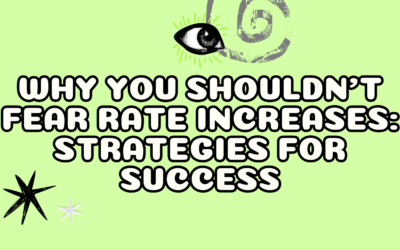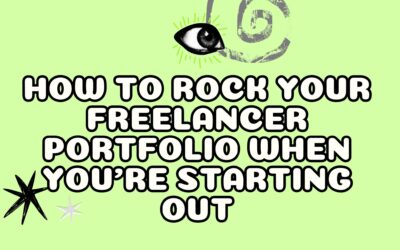Last week an old client got back in touch with me about a new project they were looking to get started. They told me the details and asked me what I’d charge to get it done by mid-March.
I considered their proposal for a mo and then checked my schedule. Sure, I could fit it in, but I didn’t NEED to take it on to reach my income goals.
So do you want to know what I did?
I confidently proposed a number at the highest end of my rate scale and sat back and waited.
For a couple of minutes afterwards I was all like, “oh hell no, what have I done?”
But their response was both refreshing, terrifying, and disappointing.
At no point did they say, “heck no, your prices are too high.” In fact, they simply accepted them and we moved onto the next stages.
A number of thoughts ran through my head at this point.
- Why didn’t they bat an eye?
- Was their budget much higher?
- Have I undersold myself (even though I was convinced I’d done the opposite)?
- How many other clients wouldn’t have batted an eye?
All very important questions, as you can see.
So even as a seasoned freelancer with regular clients and whatnot, I still have moments of panic when it comes to pitching prices.
Because the truth is, EVERY freelancer does.
No one has the answer. No one has the holy grail of pricing tucked away in their bureau.
So it really makes me cringe when other freelancers shout from the rooftops about how much you SHOULD be charging.
Should is a fun word, right? Whenever someone tells me I “should” do something, I feel like doing the exact opposite. Anyone else? Just me. Okay.
Sure, I agree that it might be a good idea to have some industry standards, but I also think that we’re all adults and capable of making our own decisions.
Do we really need more rules for what we can and can’t do in life? Aren’t there already too many of those?
I think so. Which is why I’ll never tell you what to charge clients. Because who the heck am I to have that authority?

Why I WON’T Tell You What to Charge Clients
I’ve made money mistakes in the past
No one is squeaky clean when it comes to pricing woes. Every single freelancer, at some point, has questioned their decision to charge X or Y amount.
I know I’ve made numerous mistakes (which I only realised in hindsight) throughout my career so far, some of which were gargantuan in nature (writing 20,000 words for $500? What was I THINKING?!).
How can I then sit here and say “you’re charging too much or too little”, when I’m not perfect myself?
Mistakes are what make us stronger as people and within our businesses. If I hadn’t have taken that measly $500 job for writing 20,000 words, I might never have known that it would take up waaaay too much of my time, or that clients who have tiny tight budgets are usually the most difficult to work with.
I’m a big believer in making mistakes and scraping ourselves up off the floor after them. If I’m here telling you what to charge, how will you ever find out what works best for YOU and YOUR business?
Only YOU know how much you need
We’re all in different stages of our lives. Some of you have kids, families, houses, responsibilities. Some don’t. Some of you are living it up on beaches in Thailand where the cost of living is much cheaper, while others are trying to make ends meet in a tiny, ridiculously expensive apartment in London.
We’re all on different paths, heading towards different goals, different dreams, and different futures.
In reality, we all need different incomes to survive and make a comfortable life with. I know people who can easily spend a hefty paycheque on clothes, eating out, and drinking, while others are happy home cooking and saving every penny they can.
When it comes to knowing how much you need to live on – well, only YOU know that.
How to figure out how much you need to live on:
I always suggest to budding freelancers that they figure out their expenses before they try and figure out what to charge. Create a spreadsheet and write down:
- How much you spend on rent/your mortgage a month
- How much you spend on food a month
- How much you spend on bills a month
- How much you spend on kids/pets a month
- How much you spend on your lifestyle a month (that’s eating out, hobbies etc)
It’s actually worth carrying a notebook with you for a month to see where all the pennies are going if you really want to go the extra mile with this activity.
Once you’ve got a solid number in your head, you want to then tack on extra for any savings you want to accumulate.
The final number is your minimum viable wage. A.K.A. the amount of money you need to survive each month.
And guess what? It’s different for everyone.

Your expectations and dreams are your own
Just like the cost of living is different for each and everyone of us, so is our outlook on life and where we see ourselves headed.
For some, nothing less than a mansion in the countryside with a butler will do. While others might want to stick to an off-the-grid existence with little expenses.
As for me? I’d like to get my business to the stage where I can take nice holidays, spend plenty of time with friends and family, and work on improving my strategies without taking a hit to my finances.
Grab a pen and paper and jot down some answers to these questions:
- In my ideal future (that’s a new thing I’ve coined right here), where do I see myself living?
- In my ideal future, how do I see my day-to-day schedule panning out?
- In my ideal future, what is the balance like between work and play?
When you’ve got an image in mind (go really crazy if you want to, butlers an’ all), you can then figure out how much money you need to earn to get to that stage.
Remember, it doesn’t have to be an immediate change. You can increase your prices as you go until you hit a stage that feels good for you (and your bank balance).
Basically, I’m sick of people on their high horse
Yup, this one underpins them all.
I probably read way too many articles every day, and a large number of them are about freelancing. You know, articles about how this person earned THIS much doing that (without any actionable steps to show you how to get there yourself), or articles about the state of the industry and why people are underselling themselves (without offering any actionable advice to stop underselling yourself).
And I’ve come to this (probably rash) conclusion. Peeps need to get off their high horses and come down to real-life level.
A lot of these people who are telling you what you SHOULD charge because they earned $$$$$$ doing it aren’t always thinking about YOU.
In fact, it’s pretty much all about them.
Because, even though they MIGHT think “oh this could help new freelancers because they can see what’s possible”, it can also make said new freelancers feel down because they’re NOT earning that much and they don’t believe they ever will (because, vicious circle, they don’t know how).
Geddit?
So, are you charging the right amount?
Ask yourself these questions:
- Do I feel comfortable charging this price? (If no, you’re not charging the right amount for YOU)
- Am I working way more than I want to be? (If you answered yes to this, chances are you’re not charging the right amount for YOU)
- Are clients questioning my prices? (If you answered yes to feeling comfortable, stick with it. If not, chances are your prices aren’t right for YOU)
- How much time am I spending on each project? (Divide your project price by the amount of hours spent on the project to see what your hourly rate looks like. Look scarily low? Chances are your prices aren’t right for YOU)
So now you might have an idea of whether you’re comfortable with your prices or not (and remember, rates can be a fluid thing. You can test out different prices with different clients to find numbers you’re happy with), let’s look at some of the factors that determine how much to charge clients.

The factors that determine your rate
-
The niche you’re writing for
Prices vary from industry to industry. If you’re working in the technology industry, chances are the clients you work for will have bigger budgets than those in the travel industry, just because tech peeps have more funding.
It also comes down to how popular your niche is, too. For example, being a film writer likely won’t pay as much as being a medical writer because a) you usually need medical experience to write in the medical industry, and b) because people often write about films for free, which drives down the overall prices.
-
Your minimum viable wage
Remember we talked about how much you needed to live on? That’s your minimum viable wage. This is something you might want to bear in mind when setting income goals and, therefore, you’re overall pricing structure.
It can take a bit of time to figure out a minimum viable wage you’re comfortable with, so experiment with your monthly expenses and your income goals until you find a number that you’re happy with (and that pays the bills).
-
Your maximum hourly limit
We are only one person, and there’s a limit to how much work we can do each week; how many hours we can do our best work for.
Take a moment to figure out how many hours you have each week to do ACTUAL client work. Not marketing stuff, not blogging, not accounts. ACTUAL client work.
For me, it’s about 4-5 hours a day, which makes 20-25 actual client hours per week. From that, I can figure out what my hourly rate needs to be to reach my minimum viable wage.
This is probably one of the easiest ways you can determine a rate that you’re comfortable with. But remember, you probably won’t have 20-25 hours work a week (well, not every week, anyway), so make sure there’s a cushion there for when client work dries up a bit.
-
The value of your work
I see a lot of freelancers worrying about how much they should charge an hour. And, though I’ve just harked on about setting a minimum viable wage and figuring how much you need to earn an hour, one of the better, more scalable ways you can determine your rates is by determining the value your work brings to clients.
While it can be seriously difficult to set a price on value (and it varies from brand to brand), there are a couple of ways you can start thinking about pricing in this regard:
- Testimonials: How good are your client testimonials? Can you leverage them when pitching and sending out proposals for new jobs?
- Results: What kind of results have you garnered for past clients? Is there a particular statistic you could whack out in pitches, like how many conversions you brought in for a client or how many shares a piece of your work received?

The factors that DON’T determine your rate
Okay, so we’ve looked at some of the factors that can help you work out what to charge clients, now let’s look at some of the things that DON’T.
-
What other people charge
Like I said earlier, different people are at different stages of their lives and careers. You don’t know anyone else’s story and they don’t know yours, so basing your rates off of what someone else charges is only doing yourself a disservice.
You are your own person, a unique freelancer who has a unique set of skills and value to bring to each project. Taking the time to figure this out is time MUCH better spent than losing sleep over what someone else is charging.
-
Prices potential clients dictate
Now, I’ve read and heard a lot of mixed opinions about this. A lot of freelancers suggest you ask for a client’s budget before you pitch a price, but I’m inclined to disagree.
As service provides, WE provide the service. Just like plumbers, just like hairdressers, just like any one else who sells a service for money.
Does your plumber ever ask what your budget is?
Does your hairdresser?
I’m going to go out on a limb and say no. So why should you? Once you know what to charge clients and are comfortable with your prices, no one should make you feel bad about them.
If clients can’t afford you, then they’re not your ideal client. If you really want to work with them but your price falls outside their budget, you can always offer some squeeze room.
The most important thing is to listen to yourself and (for fear of sounding woo-woo) your gut. If something doesn’t feel right about what you’re charging, change it.
If it feels right but someone else is telling you it’s too much/too little, so what? Who are they to dictate your business model and tell you what you should and shouldn’t be doing?
Your turn!
How do you feel about the whole pricing issue? How do you figure out what to charge clients? Share your thoughts in the comments below!
Want more clients?

Find Freelance Clients Fast is a FREE 7-day mini-course that will show you:
- The four elements of a profitable freelance business
- How to grab the attention of prospects
- Where to find high-paying clients
- The number one way to land clients quickly
You in?!






This is a very smart and useful post. I’m going to bookmark it. 🙂
Marie-France recently posted…You went where?
Thanks, Marie-France! So glad it was useful for you 🙂
Great post, Lizzie! I do recognize a lot of this, having started my own business a while ago and having gone through different life phases with different interests and needs. Although I am working in a whole different area, it does seem that we have experienced many similar things. I don’t know if you recognize this too, but there are certain parts of my work I really do like and other parts I like much less. A friend of mine (also a freelancer) recommended to just set my hourly rate for the work I like less higher, so when I have to do this kind of work this somehow compensates. Weird, but it works! Of course, a risk would be that clients would turn away, but since I like that work less anyways, – unless I would really need the money – that is ok with me.
Lydian recently posted…Paris Gare Du Nord Transforms Into One Big Street Art Gallery
Thanks, Lydian! It’s great to hear from you 🙂 Great idea about charging higher for the work you least enjoy. I find myself charging the top end of my rates (and sometimes higher) if I’m really ambivalent about a particular project. This seems to work well for me, and I’m glad it’s working well for you!
We’re all unique! And it’s all about the value that we feel we bring. Love your post, great topic and very well articulated Lizzie 🙂
EXACTLY, Nathalie! We’re all unique! So glad you liked the post 🙂
Really interesting post! Pricing has been a struggle for me, especially now that I’m realizing I had been really undervaluing myself the past 2 years. Your tips and advice have been a great read. I think, especially for those starting out, it’s really hard to price your services because you really have no clue what the standard for these things are. It certainly gets easier once you get more projects and understand how long it takes you versus how much you need to make.
Shaylee recently posted…How Joining Facebook Groups Changed My Business
Hey Shaylee! I think everyone goes through that stage of undervaluing themselves (I’ve certainly been there!), and it’s difficult to know when you’ve broken out of it. You’re right, there’s so much information out there about pricing, so it can be really difficult to pin-point whereabouts to position yourself. It definitely gets easier the more projects you land, because you can then figure out the cost-time ratios. Thanks so much for stopping by!
I’m just considering offering sponsored blog posts and pricing is so tricky! Some great things to think about here. Thank you!
Pricing is definitely tricky when you’re diving into paid stuff for the first time! Glad this post could help, Victoria, and let me know how it goes!
This really is a hard balance. I mean, you know what you have to make (like you said) but you also know when you just have to give way a little. I don’t mean sell yourself short, so much as, if it’s between not making any money this week, or charging a little less than intended, I choose the latter, ya know?
So true, Kristin – especially when you’re just starting out. There’s the whole “value yourself” debate vs the whole needing a portfolio and client testimonials debate, which is why I think it’s important we judge each project and opportunity for ourselves, rather than listening to someone else tell us what we SHOULD charge – amiright?!
This was a super helpful article to gage prices! I am not a freelancer per say but I have just started my blog and within my industry all of those nuggets of info you gave here can be applied! Thank you!
So glad this post helped, Suncana! Let me know if you have any other questions 🙂